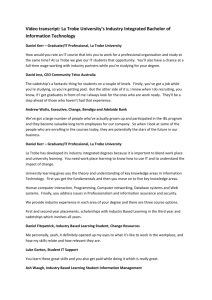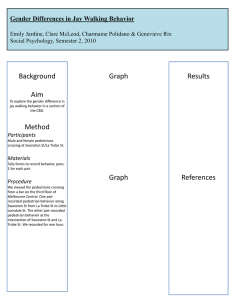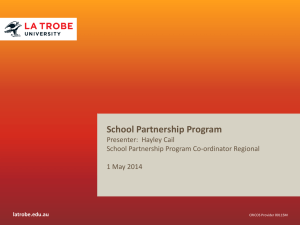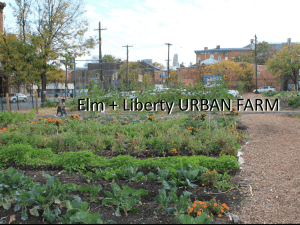Mrs Joanne Adams – The Spiritual Nature of
advertisement
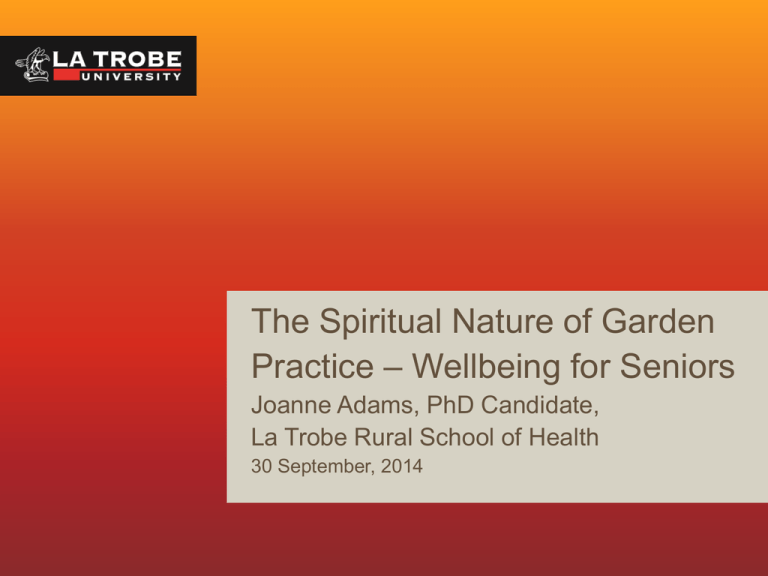
The Spiritual Nature of Garden Practice – Wellbeing for Seniors Joanne Adams, PhD Candidate, La Trobe Rural School of Health 30 September, 2014 Outline of Presentation Research Question My Approach to Research Literature / Existing Research Preliminary Findings Next Steps La Trobe University 2 Research Question Can garden practice be recognised as a form of spiritual expression? How might this assist in meeting the spiritual needs of older people and enhance health and wellbeing in the final stages of life? La Trobe University 3 My Approach to Research – A phenomenological perspective Knowing yourself, aligning methodology / method with research question – philosophy/phenomenology Acknowledging my own spiritual search Investing myself in the research – context and practice Lived experience of a gardener/pastoral carer – in-depth interviews Acknowledging assumptions – keeping a research journal/reflective diary Reaching a shared understanding – use of poetry Communicating my research La Trobe University 4 Literature / Existing Research Spirituality and Spiritual Expression Changing definition and general understanding – ̶ Tacey, D. (2003, 2006), Swinton, J. (2001, 2006) Reduced attendance within formalised religion Generational divide Impact Need to recognise spiritual expression in other forms – everyday practice ̶ La Trobe University Holloway, J. (2003) 5 Literature / Existing Research Ageing Theory and Perspectives Developmental theory – Gero-transcendence ̶ Erickson, E., Tornstam, L. (2005) Cultural view of ageing Reflection – memory, activity (physical and mental), everyday practice Home-making (Bhatti, M., 2006, 2009) Spiritual understanding / need – impact of change Aged care sector growth and limitations La Trobe University 6 Literature / Existing Research The Benefits of Contact with Nature Range of academic disciplines ̶ Eco-psychology, Biophilia, Human Geography, Sociology, Horticulture-therapy Positive relationship – multi-dimensional (physical, mental, emotional, spiritual) Evidence based practice – research methodology / method Requires an element of faith La Trobe University 7 Literature / Existing Research The Role of Activity Mental and physical participation – ways of knowing ̶ Gendlin, E. (1997), Todres, L (2007) Memory and everyday practice (past, present, future) Learning to notice, having time and space Sensory responsiveness Popular leisure activity - gardening La Trobe University 8 Preliminary Findings – Spirituality and Spiritual expression Many participants had a very structured basis to their faith: “The church was our everything when I was young, we went there for everything, now the kids don’t even go at all” (Edith) There was an acknowledgement of a change in spiritual expression: “You don’t have to go to church to be spiritual and one of the aspects of people’s lives that has changed so much – they are not worried so much about going to church and they might still have their spiritual attitudes towards things but they don’t express it like they used to” (Rex) The essence of spiritual expression is perhaps unrecognised: “They may feel it and sense it and see the perpetuation of life – living dying, replanting, regrowth – all of those – they don’t necessarily connect it to faith” (Beryl) La Trobe University 9 Preliminary Findings – History of backyard gardening Contact with nature in the garden formed a foundational memory for many participants: “My father was a great gardener too, he grew most of the things we ate. He had five or six fruit trees and chickens” (Beryl) For some this included being taught how to create a garden: “My mother was a good gardener and she’d give me a packet of seeds and I had a little piece of the garden, my own little area, not very big, but that was my garden and I was taught how to dig it and how to plant those seeds and you know I still use those principles now” (May) It also established a living connection with the past: “That geranium used to be Grandma’s, so every time I’ve moved I’ve taken it with me – its a pink, but it’s not one I’ve seen anywhere else so I’ve got to keep one in a pot coming on as well so I don’t lose it” (Prue) La Trobe University 10 Preliminary Findings – Symbolism and Reflection Learning to notice and reflect was facilitated by the garden: “As you get older I think you appreciate the little things – the little things make life worth while” (Rex) A reverence for creation was identified: “If you open a seed pod ..., there’s something very difficult to define as to the magic of it ... and the way the seeds have been created. It doesn’t look like anything at all. I guess we as humans, we don’t look like anything either when we start off” (Prue) One participant was able to relate a sense of connection: “Well I think that somehow in some mysterious way we are all interconnected and that we come from the same great love and we manifest in different ways – maybe into a tree or a flower” (Nancy) La Trobe University 11 Preliminary Findings – Accepting Change Finding new interests after retirement was very positive: “Only because of my job, I didn’t get too interested in gardening until I retired ... and we bought a new place and I started growing my own vegetables and just fell in love with doing that” (Rex). Maintaining independence and keeping active was an important aspect of wellbeing: “I’m not a loner, but I don’t crave company and that’s another thing too with aged people – a person with a garden doesn’t need people, they’ve got something to do, you’re not dependent on other people for an interest. I think it’s very important for people as they get older, I mean even if they haven’t had a garden when they were younger, its marvellous how they can learn to do it, there’s such a variety of things” (Mavis). La Trobe University 12 Preliminary Findings – Complete Absorption of Attention Noticing, watching and observing beauty provided clear benefits: “... you’re watching every week, there’s something new going on – something to take your attention – you just can’t be bored. I just feel very smug sitting here, I think how lucky I am, there’s no boredom at all, its just lovely. It must be spiritual I think” (Mavis) “I just love being able to lose myself, it doesn't matter what worries you’ve got you can come out and time just seems to stop still” (Prue) La Trobe University 13 Preliminary Findings – Coping with Ageing, Disability, Loss With advancing age a role within the family often changed: “I find when you get a bit older you become a bit redundant in lots of ways as far as the family is concerned, because they’ve all got their own lives to live and you’re able to do things for yourself (in the garden) so that you’re more enriched and not bored” (Marg). The garden provided a means to cope with physical and emotional upset: “Sometimes if you’re not feeling 100%, mentally or physically, something might have upset you, you just go out there and just look around the garden and think – Oh they all look happy and cheerful – why aren’t I?” (Mary) Understanding and accepting loss was experienced by many gardeners: “That’s one thing I say to my children – gardening is a bit like life – you do lose some and you have to accept the losses” (Nancy) La Trobe University 14 Preliminary Findings - Wellbeing Maintaining a sense of wellbeing for many was related to an experience of mental health: “I feel that part of me would die if I couldn’t garden – its a very powerful feeling” (Prue) “If you feel a bit down, if you go out into the garden it often helps, you think of other things and it gives you something else to think about I suppose” (Edith) “The best benefit I get is that I relax, because I can sit there and nobody’s hassling me ... It’s so peaceful and I think that’s basically what I get from the garden is peace” (May) La Trobe University 15 Next Steps Further interviews with Pastoral Carers Analysis of Findings Journal publication Writing ... La Trobe University 16 Thank you Thank you to CAPS for the opportunity to present my research Thanks also to my Supervisors: Dr Jan Pascal Dr Virginia Dickson-Swift Prof. David Tacey

